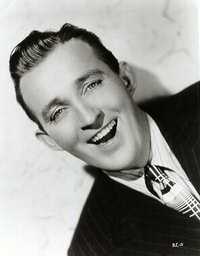One of the greatest singers of the Twentieth Century, Bing was born Harry Lillis Crosby in Tacoma, Washington, on May 3, 1903.* In 1906, his family moved to Spokane. He received his nickname during childhood when friends began calling him after the lead character in the comic strip ''The Bingville Bugle.''
In 1920, Bing entered Gonzaga College to study law. His career choice changed after he bought a mail-order set of drums and joined a local group called The Musicaladers, managed by Al Rinker. When the group broke up in 1925, Bing and Al headed to Los Angeles, where they joined the vaudeville circuit. Their big break came one night in 1926 when orchestra leader Paul Whiteman heard them sing and hired them.
Problems arose during a performance at the Paramount Theatre in New York in January 1927. The theatre didn't have electronic amplification, and the audience had difficulty hearing Crosby and Rinker's vocals. They were teamed with a third vocalist, Harry Barris, and returned to the orchestra in March as the Rhythm Boys. They soon became Whiteman's star attraction.
Bing's love for having a good time eventually began to get in the way of his performances. He was arrested for drunken driving during the filming of the movie The King of Jazz, featuring Whiteman and his orchestra. It was the last straw for Whiteman, who released the trio after the completion of the film.
They soon found a job with Gus Arnheim's band at the Cocoanut Grove in Los Angeles. Arnheim began pushing Bing to the forefront as a soloist, and in January 1931, Bing recorded his first solo hit, ''I Surrender Dear.'' Increasingly, crowds came to hear Bing solo, and the Rhythm Boys as a group receded to the background.
Bing began to skip performances at the club. The manager docked his pay and Bing walked out in protest, taking the Rhythm Boys with him. But the manager persuaded the local musicians' union to ban the trio for breach of contract, and the Rhythm Boys were forced to dissolve.
It was while Bing was performing at the Grove that he caught the attention of movie producer Max Sennett, who hired him to star in six comedy shorts. That led to his signing a contract with Paramount. His first of fifty-five feature films was The Big Broadcast, in 1932. Between 1944 and 1948, Bing was the number one box office draw in the country. He won an Oscar in 1948 for his role in Going My Way. Some of his most popular films include the Road movies with Bob Hope and Dorothy Lamour.
Bing recorded more than 1,700 songs during his career, most of them on the Decca label, for whom he was under contract from1934-1955. He is considered the most successful musical artist of all-time. His recording and film activities fell off during the late sixties and early seventies as he was plagued by health problems. A non-cancerous tumor was removed from Bing's lung in 1973. After his recovery, he resumed an active career, recording ten albums in the last three years of his life. The end came suddenly. Bing suffered a heart attack and died while playing golf in Spain on October 14, 1977.
